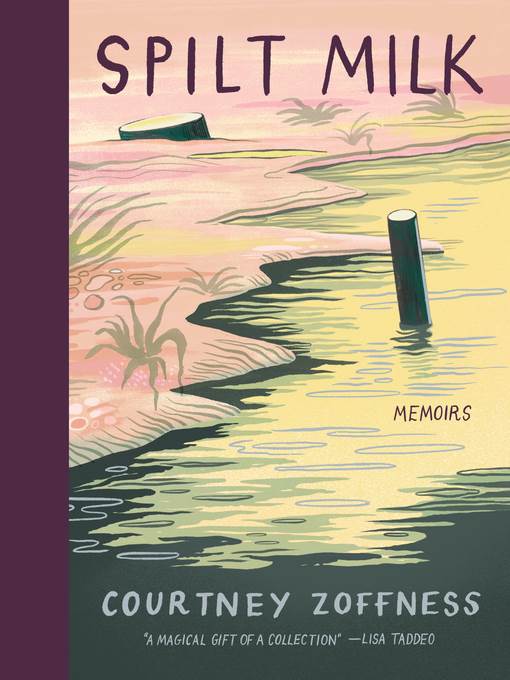
Spilt Milk
کتاب های مرتبط
- اطلاعات
- نقد و بررسی
- دیدگاه کاربران
نقد و بررسی

January 15, 2021
A series of essays cohere into an evocative memoir. In her first book, Zoffness, winner of a Sunday Times Short Story Award, gathers thoughtful pieces on themes that include motherhood, anxiety, and Jewish identity. Raised by extraordinarily fearful parents and worried about bequeathing her own anxiety to her son, the author studied medical journals and textbooks "to learn parent-child transfer." She tries to assuage her 6-year-old's fears, she tells her therapist, by putting up "a shield of faux calm." The therapist referred her to a nearby doctor: "Maybe," she suggested, "if you talk to her you can respond to him with real calm instead of faux calm." Her 4-year-old son, too, incites her worries because he is obsessed with becoming a police officer. Zoffness is dismayed by "the heraldry of dominance and toughness that my boys can't help but inhale," and she finds it difficult to talk about injustice and brutality with such young children. She comes to realize, though, that the child is not drawn to violence; as the younger sibling, he just wants to exert some power. In "Ultra Sound," Zoffness reflects on her tense relationship with her own mother, a deeply private woman who refuses to share details about her past as a performer. "Holy Body" merges the theme of motherhood with Jewish identity: Zoffness chronicles her mikveh, or ritual bath, intended, in part, "to help Jews of all stripes honor life transitions or commemorate occasions." Zoffness acknowledges her momentous transition from childbearing in contrast to a friend, a mother of three, who has become a gestational surrogate, an act of altruism the author finds both selfless and mystifying. In other sharp pieces, the author recounts teenage angst and a friend's betrayal; a visit to an astrologer recommended by a therapist; and confronting evidence of the Holocaust in the idyllic city of Freiburg, where Zoffness was teaching. A graceful debut.
COPYRIGHT(2021) Kirkus Reviews, ALL RIGHTS RESERVED.

Starred review from January 25, 2021
Zoffness, director of the creative writing program at Drew University, debuts with a keenly perceptive collection of essays that considers, among other topics, family dynamics, motherhood, and her “inconsistent” relationship to Judaism. In “The Only Thing We Have to Fear,” Zoffness worries she’s passing along her childhood anxieties to her first-born. “Ultra Sound” recounts her attempts to become closer to her mother, who was once in a band that opened for the Doors, yet never played any of her recordings for her children. “How to read such caginess?” Zoffness asks. In “Holy Body,” she attends a ritual cleansing at a mikvah center while visiting a childhood friend from Jewish summer camp. Zoffness connects her personal experiences to larger cultural moments, reflecting, for instance, on her four-year-old son’s obsession with becoming a police officer amid the Black Lives Matter protests: “My son still misunderstands what officers say when taking people into custody. You’re unarrested, the LEGO officer in his left hand says to a LEGO wrongdoer in his right.” Zoffness delivers masterful essays in a fresh, vulnerable voice readers will want to hear more of.

February 15, 2021
"My protagonists are aspiring mothers and new mothers and daughters struggling to get close to their mothers," writes Zoffness of the stories she wrote during graduate school. That also describes the identities she inhabits in this terrific collection of personal essays. Within individual essays and across the collection, Zoffness moves back and forth through time with an elegant quickness that insightfully captures how the past shapes who we are and who we might become. Indeed, the significance of genetic, material, and spiritual inheritance threads through the book. In "Holy Body," Zoffness writes of visiting a mikvah, a Jewish ritual bath for women, run by an estranged friend from summer camp who has agreed to be a surrogate for a fertility-challenged couple an ocean away. With characteristic humor and sensitivity, Zoffness considers what we're willing to do for ourselves and for others and what we give both knowingly and not. In this and other essays, Zoffness' Judaism is front and center, from her connection to an exiled Syrian Jew to the Holocaust's latent shadow over a summer in Germany, but this is not a book about Judaism. Rather, these essays are about the cultural, familial, creative, and historical identities that help us make sense of our place in the world.
COPYRIGHT(2021) Booklist, ALL RIGHTS RESERVED.

























دیدگاه کاربران